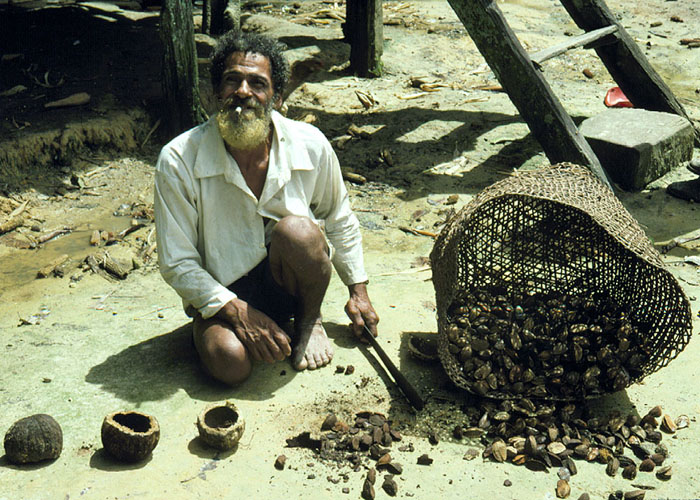Facts
One question you may have is, “Why choose the Brazil nut as
the emphasis of your website?” Not only is Brazil a part
of my personal culture, but the Brazil nut is one of the most
unique nuts found in the world. Brazil nuts are the only
tropical nut from the lowland Amazon sold over the entire globe.
In previous pages I revealed only a glimpse of the harvesting
process required to get these nuts from the tree to store
shelves all over the world, and now you can learn a little bit
more of that process. As mentioned, B. excelsa trees are
very difficult to maintain on commercial plantations, so the
harvesting process begins with the collection of pods scattered
throughout the wild. Once collected, the fruits are
carried to a stream/river where boats transport them to local
huts. The local harvesters break open the pods to release
the nuts; once released, they are either shelled or simply left
with the shell intact. The harvested nuts are then sold to
traders who ship them downstream to brokers. The act of
shelling the nuts is becoming more of a common occurrence because
shipping unshelled nuts is not only more expensive, but
unshelled nuts are harder to sell in stores (not everyone owns a domestic
nutcracker).
of the most
unique nuts found in the world. Brazil nuts are the only
tropical nut from the lowland Amazon sold over the entire globe.
In previous pages I revealed only a glimpse of the harvesting
process required to get these nuts from the tree to store
shelves all over the world, and now you can learn a little bit
more of that process. As mentioned, B. excelsa trees are
very difficult to maintain on commercial plantations, so the
harvesting process begins with the collection of pods scattered
throughout the wild. Once collected, the fruits are
carried to a stream/river where boats transport them to local
huts. The local harvesters break open the pods to release
the nuts; once released, they are either shelled or simply left
with the shell intact. The harvested nuts are then sold to
traders who ship them downstream to brokers. The act of
shelling the nuts is becoming more of a common occurrence because
shipping unshelled nuts is not only more expensive, but
unshelled nuts are harder to sell in stores (not everyone owns a domestic
nutcracker).
With all of the use that comes from B. excelsa, whether it is used for food or economic purposes, it is a dreadful thought to imagine the Amazon without this incredible organism. At one point in time, B. excelsa was one of the fastest-vanishing trees in the entire Amazon rainforest. Logging of the trees is now prohibited by law, but these restrictions are not always honored as land clearance is still a threat to the trees. If you would be interested in getting involved with helping to prevent deforestation in the Amazon, visit the International Rivers webpage for more information. International Rivers is just one organization that I found whose goal is to stop deforestation in the Amazon, but there are plenty more out there who need all the help that they can get!
To see where I got my information, continue to the References page!